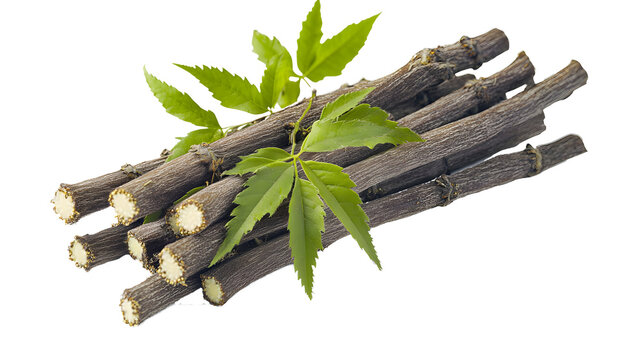Ayurvedic Perspective and Benefits of Neem
In Ayurveda, oral health (Danta Swasthya) is deeply linked to overall health. The Neem Datun is not just a brush; it’s a medicinal tool.
Here are its primary benefits, explained through an Ayurvedic lens:
- Powerful Pitta Pacifier (Cooling Effect):
- Neem has a cold potency (Sheeta Virya). This is its most significant property for oral health. It directly counteracts excess Pitta (heat), which is the root cause of common problems like bleeding gums, inflammation, mouth ulcers, and bad breath.
- Exceptional Antimicrobial and Antibacterial:
- Neem contains compounds like nimbidin and azadirachtin that are highly effective against the bacteria that cause plaque, cavities, and gingivitis. It acts as a natural antiseptic for the entire oral cavity.
- Anti-inflammatory and Analgesic:
- It helps reduce gum inflammation (swelling and redness) and soothes toothache and gum sensitivity due to its anti-inflammatory and mild pain-relieving properties.
- Blood Purifier (Raktashodhak):
- Ayurveda believes many skin and oral issues originate from impurities in the blood. Neem is a premier blood purifier. Using the datun is believed to have a systemic effect, helping to clear skin conditions like acne that are linked to oral health.
- Astringent and Gum Strengthener:
- Its astringent taste (Kashaya Rasa) helps tighten and tone the gums, reducing looseness and preventing gum recession. This makes it excellent for gum health.
- Cleanses the Tongue and Freshens Breath:
- The act of chewing and brushing naturally cleans the tongue, removing coating (ama) and bacteria that cause bad breath. Neem’s inherent bitterness leaves the mouth feeling clean and fresh.
How to Use a Neem Datun (Step-by-Step)
- Select a Twig: Choose a fresh, flexible twig about the thickness of your little finger.
- Peel the Bark (Optional): You can gently peel a small section of the bark off one end.
- Chew the End: Chew on one end of the twig slowly and gently until it softens and frays into soft, brush-like fibers.
- Gently Brush: Use the frayed end to brush your teeth and massage your gums using gentle up-and-down and back-and-forth motions. There is no need for toothpaste.
- Clean the Tongue: Use the bristles to gently clean your tongue’s surface.
- Discard the Twig: Neem datuns are single-use and biodegradable, making them an eco-friendly alternative to plastic toothbrushes.
Important Considerations and Precautions
- Gentleness is Key: The twig can be abrasive if used too forcefully. Always use gentle pressure to avoid damaging tooth enamel or irritating gums.
- Not a Replacement for All Modern Care: While excellent for prevention and gum health, it may not provide the cavity-fighting protection of fluoride in toothpaste. Many people use it as a complementary practice.
- During Active Mouth Ulcers: Avoid brushing directly on an open, painful mouth ulcer, as it can cause irritation.
- Consult a Professional: If you have specific dental concerns like sensitive teeth, receding gums, or extensive dental work (braces, bridges), consult your dentist before switching entirely.
Comparison with a Toothbrush
| Aspect | Neem Datun | Modern Toothbrush |
| Cleaning Action | Mechanical + Therapeutic (herbal medicine) | Primarily Mechanical |
| Environmental Impact | Biodegradable, zero waste | Plastic, contributes to waste |
| Antibacterial Effect | Intrinsic, from Neem’s compounds | Relies on toothpaste ingredients |
| Gum Massage | Excellent, promotes gum health | Good, if done correctly |
| Convenience & Cost | Very low cost, requires no toothpaste | Recurring cost of brush & paste |
| Fluoride | No | Yes (in most toothpastes) |
In summary, the Neem Datun is a time-tested, natural, and holistic approach to oral hygiene. It is highly effective for maintaining healthy gums, preventing bacterial growth, and providing a deep clean. If you are looking for a natural and sustainable alternative, it is an excellent option to explore, preferably under guidance.
Disclaimer: This information is for educational purposes only and is not medical advice. Please consult with a qualified Ayurvedic practitioner or dentist for personalized recommendations.
Also View This Video About Neem Leaf
https://www.facebook.com/watch/?v=1792541364965571&rdid=WGxAxuaiUlr4abKn

